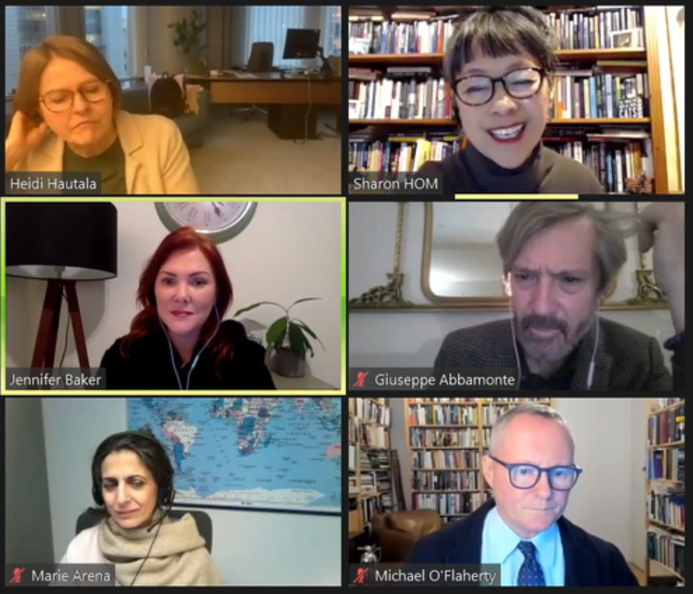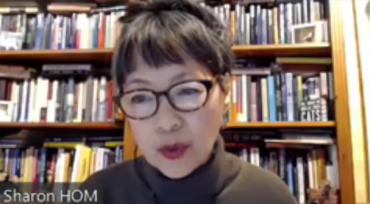本文是在2020年12月9日第22屆歐盟非政府組織人權論壇:新技術對人權的影響
「開局立論」專家組發言的編輯和擴充版[1]。
引言
感謝歐盟委員會、歐洲對外行動署以及人權和民主網絡給我這個機會,參加今年的歐盟非政府組織論壇,探討新技術對人權的影響[2]。我很榮幸能在各位高級別嘉賓之後發言——剛才聽到歐盟強烈重申對前線維權人士的持續支持非常令人鼓舞。我想對世界各地,特別是中國的人權捍衛者、民間社會團體和活動人士說,我希望歐盟官方的聲援能給你們帶來希望。雖然這句話和許多口號一樣已經在香港成為禁語,但我想用粵語說一聲:「加油!」
在國際人權日前夕,今年的論壇適逢國際人權體系的一個特別關鍵的時刻。在我們慶祝聯合國成立75周年之際,國際人權體系在紛繁複雜的辯論中繼續發展,這在條約機構機制、特別程序和民間社會的參與方面尤為突出。國際人權體系為人權捍衛者提供了重要的規範平臺和一套有利工具,而由中國等不當限制權利的國家主導的,破壞和取代國際標準和規範的行為威脅著其完整性和有效性。
自2019年底以來,2019冠狀病毒病一直被用作限制權利的首要衛生應急理由。中國最近發表了一份關於後疫情時代世界秩序的立場文件,包括對5G和數據安全的提議[3]。這是我們觀察到的對疫情進行利用,甚至是濫用的重要趨勢。當全世界都在努力應對2019冠狀病毒病這一上世紀以來規模最大、最嚴重的全球大流行病時,我們還不能談論「後疫情」,因為我們還陷於其中。雖然疫情終將過去,但考慮到它對全世界數以百萬計的民眾、對各個行業,以及對我們工作、學習和聯絡感情的方式的影響,我想我們任何人都不能指望回到哪怕近似於病毒暴發之前的「正常狀態」 [4]。
 (Clockwise from upper left: Heidi Hautala, VP, European Parliament; Sharon Hom; Giuseppe Abbamonte, Director for Media Policy, European Commission; Michael O'Flaherty, Director, European Union Agency for Fundamental Rights (FRA); Marie Arena, MEP and Chair of the EP Subcommittee on Human Rights; Jennifer Baker, panel moderator.)
(Clockwise from upper left: Heidi Hautala, VP, European Parliament; Sharon Hom; Giuseppe Abbamonte, Director for Media Policy, European Commission; Michael O'Flaherty, Director, European Union Agency for Fundamental Rights (FRA); Marie Arena, MEP and Chair of the EP Subcommittee on Human Rights; Jennifer Baker, panel moderator.)技術對我們適應疫情發揮了關鍵作用,既有增進效應,也有負面影響,即前面一些發言者提到的「陰暗面」。政府、民間社會團體和個人都加大了對技術的使用和數字安全工具的使用。技術發展的速度、範圍和深度不斷增大,不可避免地超出了我們的法律法規、道德發展和文化規範進行有意義和有效應對的能力。的確,技術的未來正在以超乎我們想像的速度到來[5]。事實上,在我們絞盡腦汁,試圖認清算法控制我們生活的程度和影響之時,我們以為的「新」技術可能已經匯入了技術的歷史長河中。即使是人工智能、大數據和強化生物識別監控這個「美麗新世界」的建造者們,也並不真正地完全瞭解他們強大的機器和算法在學習什麼,以及它們將會或者可能會造成的社會影響的全貌[6]。
「左」邊:專制國家帶來的挑戰
中國是經濟和政治上的世界強國,也是全球最具影響力的國家行為者之一。三十多年來,我的組織中國人權一直致力於支持人權捍衛者和應對民間社會在中國所面臨的嚴峻挑戰。在論壇的全會開幕式上,國際人權聯盟主席愛麗絲·莫格威(Alice Mogwe)強調了中國的安全政策、人工智能部署、對面部識別攝像頭和預測分析的廣泛使用的危害,以及它們對少數民族和人權捍衛者和平行使權利的嚴重影響——事實上,這對全中國14億人和平行使權利都有嚴重影響[7]。
在党國體制下,中國對這些技術的部署擁有國家安全、網絡安全和法律制度的支持,強大的警察安全機制的支持,以及強制灌輸「正確的」行為思想(即習近平思想[8])和樹立對党忠誠的全面、系統的意識形態機器的支持[9]。中國對網絡社區實行全方位的數字監控,以確保公民保持「守信」 [10]。此外,政府還建立了全國性的社會信用體系,幫助激勵民眾做出理想的社會行為[11]。
中國的專制政權不僅將這些新技術和數字工具作為武器,打擊民間社會和人權捍衛者,並進行有針對性的大規模監控和審查,還向境外輸出數字專制主義模式,包括在「一帶一路」倡議下的重大基礎設施項目沿線和「數字絲綢之路」沿線[12]。不幸的是,中國監控技術的出口需求持續增長[13],也加劇了這一領域的市場競爭。歐盟成員國和其他西方民主國家政府總是面臨著一組矛盾:一方面要顧及經濟和戰略利益,另一方面又要應對出口這項技術的風險,包括終端產品或兩用技術對權利的相關影響。
依照恢復國家應有國際地位的「中國夢」[14],中國還不加掩飾地宣佈了成為全球數字技術發展領導者的雄偉目標和政策,包括人工智能、量子計算、機器人、生物識別監控等顛覆性技術[15]。中國在網絡治理和標準制定方面也越來越積極[16],比如在互聯網治理、技術標準制定、人權、網絡安全和反恐等方面的多邊機構擔綱領導角色。作為中國在技術領域的領頭羊,百度、阿裡巴巴和騰訊也塑造著全球的數字架構,中國的工程師也在積極推進新技術標準的制定[17]。
鑒於西方政府和企業對網絡空間隱私問題的關注,我想指出區分規範、背景和執行實踐的重要性。中國的國內法,尤其是《網絡安全法》[18]及實施細則,納入了國際隱私規範的語言,甚至包括歐盟《通用數據保護條例》的語言,如知情同意原則、信息披露原則、信息收集和後續使用範圍,以及數據最小化原則[19]。 然而,儘管這些法律條款在形式上有規範性的規定,但我們需要結合中國以不符合國情為由,拒絕法治和國際人權標準這些「西方概念」的制度背景來進行理解[20]。
形式上的隱私保護也需要在中國互聯網法律制度的背景下看待,特別是攸關隱私和匿名性的對使用加密工具的法律限制[21]和對實名制的要求[22]。《網絡安全法》還要求在中國境內收集的數據必須在當地存儲,要獲得批准才能向國外傳輸。例如,公司必須證明傳輸這些數據的合法商業目的[23]。
在中國利用這些數字工具進行打擊和審查的同時,活動人士也在利用它們進行動員、組織、抗議或其他社會行動。中國大陸的LGBT(同性戀、雙性戀和跨性別者)活動人士、女權活動人士和法律倡導者一如既往地利用社交媒體平臺,提高公眾對家庭暴力、性騷擾、性別歧視以及打壓律師和公民記者的認識[24]。在香港2019年的大規模社會抗議活動中,前線活動人士和普通市民利用社交媒體動員、組織或參與行動。在技術能手的幫助下,他們建立了民意調查/預選的網絡平臺,並利用數字工具記錄執法部門濫用暴力之猖獗,提高公眾對這一問題的認識。鑒於中國官方媒體向國際社會推廣強有力的、有違事實的另類政府敘事並頗有成效,這些數字工具也起到了至關重要的反擊作用。然而,儘管這些活動人士足智多謀,但對和平抗議者的逮捕和騷擾以及對選舉制度的攻擊仍在香港繼續上演[25]。為了支持國家對和平行使權利的持續鎮壓,政府部署的技術監控和監視工具在不斷擴張,為維權人士和民間社會行動帶來了更大和新增的風險。
「右」邊:矽谷帶來的挑戰[26]
作為與中國數字專制模式的對比,我想對已經被提及的,在隱私和數據收集、匯總和使用上造成權利問題的主流商業模式進行一些補充。瑪麗·阿雷納(Marie Arena)和愛麗絲·莫格威所提到的技術濫用,可能不僅僅是技術被別有用心之人誤用的問題,而可能是技術本身就是為了誤用而設計的。換言之,這不僅是技術的陰暗面,更是這些顛覆性的專利社交媒體技術設計的一部分。正如《大西洋月刊》執行主編阿德裡安娜·拉弗朗斯(Adrienne LaFrance)所強調的,「以臉書為首的當今社交網絡的建立初衷,就是助長讓它們如此有害的東西。這根植于它們的根本架構。」[27]事實上,越來越多的前矽谷「寵兒」開始發聲,分享他們引人警醒的反思,就算不是否定他們所建立的東西本身,也至少對其後果和影響進行了批判[28]。
虛擬現實聯合創始人、計算機工程師兼音樂人賈倫·拉尼爾(Jaron Lanier)奮力呼籲社交媒體用戶刪除賬號,或者最起碼將其停用,以創造空間來探索與他人聯絡感情的其他方式,(重新)發現自己的自主性。曾經供職于穀歌的特裡斯坦·哈裡斯(Tristan Harris)警告,技術劫持著人們的思想。二人的關注點都在於拉尼爾提出的,用來描述巨型科技公司主導商業模式的「BUMMER」一詞,即「改變用戶行為,使其成為可以租用的寶庫」(behaviors of users modified and made into an empire for rent)[29]。神經科學研究人員已經敲響了算法引發的社交媒體成癮問題的警鐘,而這正是BUMMER的目標——更多的增長,更多的參與和點擊會帶來更多的收益。有批評者還指出,在英語裡,「user」(用戶)一詞其實只用於兩個範疇:毒品和互聯網[30]。有趣的是,社交媒體平臺或工具的開發者在被問及是否允許他們的孩子使用這些工具時,他們的回答是「不」,至少在兒童或青少年階段不行。我認為這應該引起我們的警覺[31]。
不過,我並不是在提出停止使用所有新技術的盧德主義論調,也不是說這些巨型科技公司在擴大表達自由空間或獲取更多信息方面沒有做出良好貢獻。但正如尤瓦爾·赫拉利(Yuval Harari)所言:「既然領導技術革命的公司和企業家會理所當然地歌頌他們的創造,那麼社會學家、哲學家和歷史學家就應該……敲響警鐘,闡釋這些發明可能引發大問題的所有情形。」我想補充的是,人權學者、活動人士、政策制定者以及我們所有人,都有責任保持批判性的警惕,審視這些技術的發展、使用和影響,並重新設想其他更有利於權利賦予的模式。
左右為難
在馬克·紮克伯格(Mark Zuckerberg)的2017年「宣言」之後,臉書發起了一場大規模的社交工程實驗,打造了現在已有超過16.9億用戶的在線互聯社區,讓他們全都在擁有選擇和自主性的錯覺下在網上互動。用戶甘願放棄的大量數據以及基於這些數據對行為的算法操控,就是被販賣的利潤巨大的產品。但這個在線「社區」也遭受著錯誤信息、假新聞、網絡欺淩和謾駡、陰謀論以及放大和傳播這一切的信息回音室的禍患。
中國當前的數字威權主義實驗正在對包括8億餘網民在內的14億人實施控制。當局不是在將這一全面監控系統收集到的龐大數據變現,而是在部署監控技術工具,以確保黨和國家的意識形態和社會控制。除了政府控制網上表達並以此助長自我審查之外,還有在網上大量輸出民族主義觀點或「帶節奏」的水軍,以及進行野蠻謾駡和網絡欺淩的網絡戰狼。
這兩種模式和社會實驗都對民主以及作為人權核心的人類尊嚴和自主性構成了威脅。因此,人權捍衛者以及所有社交媒體或技術工具的使用者都處於左右為難的境遇——被「監控資本主義」的利益操縱[32]以及党國專制主義的經濟和政治限制所夾擊。
除了確保接入和連接互聯網的公平性的全球性挑戰,以及包括虛假信息在內的重重威脅,這兩個強大的宇宙還構成一個更深層次的生存威脅——我們可以把這兩個擁有強大引力的技術中心視為黑洞。一個黑洞正在吸納與我們相關的大量數據,讓它們消失在「海妖服務器」中,即集聚矽谷權力和財富的公司用以謀利的巨大雲計算服務器[33],而另一個黑洞則為黨國專制體制服務。
對於防火長城外的網民和奮力「翻牆」而出的中國大陸人權捍衛者來說,他們登錄的是什麼樣的網絡社區?是一個不受審查的自由互聯網,還是另一個擁有新的信息回音室,被更多的假新聞、假人設、虛假信息和陰謀論的衝擊所淹沒的網絡空間[34]?正如其他發言者和論壇概念說明所強調的,這些都是嚴重而複雜的問題,需要關鍵利益攸關方的批判審視、創新對策和政治意願[35]。
那該怎麼做呢?
儘管受到國際社會廣泛而強烈的關注,但嚴重的侵犯人權行為仍然在中國延續,包括強行監禁和監控數百萬維吾爾族人[36],壓制西藏的文化和宗教表達,以及打壓律師、維權人士和記者[37]。香港仍然是維護人權的前沿陣地,也是對中國是否尊重和遵守其國際義務的考驗。涵蓋面甚廣的《香港國安法》在當地造成了廣泛而深刻的影響,包括在公共場所加強警力、對團體集會進行恐嚇、騷擾和鎮壓,以及線下和網上的審查和自我審查。如今,刑事監控的威脅已經超出了中國國界,扼制著表達自由、學術自由並引發自我審查。
雖然人權方面的挑戰依然嚴峻,但為了保護人權而與中國進行更有效接觸的政治意願可能正在加強。對信息控制和審查制度促成疫情蔓延的致命後果的認識,也促使國際社會對中國的看法有所變化並日趨負面,這在皮尤研究中心對14個國家展開的新調查(2020年10月)中有所反映[38]。當然,輿論的轉變和對中國海外影響力的抵制無助于推進中國成為受人尊敬的全球領導者的雄心。或許我們可以利用地緣政治斷層的變化作為契機,進行超出慣有模式的建設性交涉。
正如其他論壇發言者所強調的,政府可能越發認識到,安全、貿易和可持續環境的相互關聯並不是說說而已,有效的政策必須在人權的框架內制定。首先,除了在孤立的政策辯論中討論之外,人權必須處於雙邊關係的最前沿並被納入其整體。正如中國人權在我們的白皮書《香港未來言棄尚早》中指出的,《香港國安法》本身規定了基本權利和自由必須得到保護,包括「《基本法》和《公民權利和政治權利國際公約》、《經濟、社會與文化權利的國際公約》適用於香港的有關規定」(第4條),並要求堅持法治原則(第5條)[39]。以中國缺乏法治為由,對這些權利條款的譏誚不屑,錯失了推進可能有助於加強個案辯護以及所需立法和制度改革的政策和干預的重要機會和戰略。
但縱觀快速發展的當下,符合人道主義的技術是否可能?我們如何以一種有意義的方式讓人類尊嚴、自主性與選擇重歸中心?還可以探索哪些商業模式?由幾位前矽谷科技開發者和專家成立的人道技術中心(Center for Humane Technology)正專注於就這些技術的風險和危害提高認識的公眾教育、支持行業文化的變革並為政策選擇獻計獻策[40]。但歸根結底,我們是否應該繼續讓私營部門乃至巨型科技公司控制局面,主導我們思考技術的方式?
我們不能局限於一小部分前矽谷寵兒以及事後認錯,而是要對更多樣化的利益攸關方進行支持和賦能。同時,讓更多利益攸關方參與討論只是一個開始。我們還需要認識到,民間社會、非政府組織和人權捍衛者在參與政策討論,甚至是任何討論時都不具有平等的經濟、政治和話語權。我們要如何以一種強有力的方式,將不受股東利潤壓力影響的利益攸關者納入政策探討?例如,開源技術社區的作用和功能如何能得到擴大和深化?舉例來說,更系統地納入開源社區將凸顯擴大和加強監管的潛在有效性,因為巨型科技公司可以輕易地以業務開銷吸收監管成本。
對於致力於打造互聯網自由技術社區的開發者,我們要如何整合他們的專業知識和見解?雖然互聯網自由社區(包括開發者、非政府組織和能力建設者)仍在發展階段,但它所採取的措施基於一個關鍵前提:要想有效利用技術促進和保護權利,就必須通過有意的設計來實現。在整個過程的不同階段,包括需求評估、設計、實施、抽審、評估,以及技術解決方案、工具和方法的後續迭代,都需要考慮到用戶的需求和視角。
最後,我們每一個人都需要以不同的身份批判性地審視我們與新技術,尤其是社交媒體的關係、對它們的使用以及它們的影響,並探索其他方式聯絡感情、進行社區建設,並以有意義的、本真的方式行使權利。正如拉弗朗斯所呼籲的:現在修復我們社會和文化中被社交網絡嚴重破壞的方面還不算太晚[41]。
還有一點……
既然之前有發言者提到了貓和貓咪搞笑圖片,那我也多提一句。大家都知道,貓咪搞笑圖片稱霸著互聯網。用穀歌搜索的話,在0.53秒內會產生37萬個結果。賈倫·拉尼爾在《立刻刪除你的社交媒體賬號的十個理由》中這樣開頭:「讓我們從貓開始說起。」在對我們的貓咪朋友的聰慧和獨立大加讚賞之後,他提出:「互聯網上的貓是我們對人們在互聯網上的未來的希望和夢想。」因此,他的書講的是「如何做一隻貓」,即如何在一個由「一些史上最富有的公司」所經營的算法不斷監控和操縱的世界中保持自主性[42]。的確,儘管網上有數十萬個貓咪搞笑圖片,但我們仍然永遠馴服不了貓,也無法左右它們的意識。作為領養了13只流浪貓的「貓奴」,我太贊同不過了。讓我們學著在網上做一隻貓吧。
[1] For information on the Forum, see https://eu-ngo-forum.b2match.io/home; video (1:08:39-1:28:03; 2:01:35-2:04:49; 2:09:49-2:12:55; 2:22:03-2:22:56): https://eu-ngo-forum.b2match.io/page-381.The panel was moderated by Jennifer Baker. Other panelists, in order of speaking were: Giuseppe Abbamonte, Director for Media Policy, Directorate General for Communications Networks, Content and Technology, European Commission; Michael O'Flaherty, Director of the European Union Agency for Fundamental Rights (FRA); Marie Arena, Member of the European Parliament and Chair of the EP Subcommittee on Human Rights; Eliska Pirkova, Europe Policy Analyst, Access Now; and Heidi Hautala, Vice-President, European Parliament.
[2] As described on its homepage, https://eu-ngo-forum.b2match.io/: “[t]he EU-NGO Human Rights Forum will provide an essential platform to elaborate recommendations on how the EU can further foster human rights compliance in the digital sphere and seize the potential of new technologies to promote the protection of human rights for all. It will also represent an opportunity to create or strengthen international multistakeholder networks.”
[3] “China Publishes Position Paper of the People's Republic of China On the 75th Anniversary of the United Nations,” Ministry of Foreign Affairs of the People’s Republic of China, September 10, 2020, https://www.fmprc.gov.cn/mfa_eng/wjbxw/t1814034.shtml; and “Global Initiative on Data Security,” Ministry of Foreign Affairs of the People’s Republic of China, September 8, 2020, https://www.fmprc.gov.cn/mfa_eng/zxxx_662805/t1812951.shtml.
[4] However, while the rest of the world suffers enormous human costs, China’s tech giants and CEOs in a range of sectors have been doing really well during the year of COVID-19. Thanks to the pandemic, China’s e-commerce, health care industries, food delivery services, vaccine developers, and PPE producers contributed to enormous increase in personal wealth. As recently reported in Forbes, the top 400 richest individuals in China include: Jack Ma, Alibaba founder (net worth $65.6 billion); Pony Ma, CEO of Tencent, (net worth $55.2 billion), and Wang Xing, CEO of Meituan-Dianping, a home delivery service (net worth $22.5 billion, after a quadruple increase during COVID-19). Russell Flannery, “China’s 400 Richest 2020: Total Wealth Surges Amid Pandemic,” Forbes, November 4, 2020, https://www.forbes.com/sites/russellflannery/2020/11/04/chinas-400-richest-2020--total-wealth-surges-amid-pandemic/?sh=749688db3d7a.
[5] See Diamandis, Peter H. and Kotler, Steven, The Future Is Faster Than You Think: How Converging Technologies Are Transforming Business, Industries, and Our Lives, Simon & Schuster Paperbacks, 2020. The convergence of independent lines of accelerating technology (e.g. AI) with other lines of technology (e,g, augmented reality) at an ever-increasing rate has turbo-boosted both the rate and scale of major transformations across all fields.
[6] AI programs are even learning beyond human capacity or guidance. Yuval Harari cites an example of Google’s AlphaZero that used the latest machine learning principles to self-learn chess by playing against itself. It won twenty-eight games and tied seventy-two against the champion program, Stockfish8. “AlphaZero went from utter ignorance to creative mastery in four hours, without the help of any human guide.” Harari, Yuval, 21 Lessons for the 21st Century, Vintage, 2019, p.44.
[7] EU-NGO Forum 2020, Plenary opening session (Alice Mogwe from 21:00 to 28:28), December 9, 2020, https://eu-ngo-forum.b2match.io/page-381. HRIC has been an active member of the FIDH for decades and appreciates Alice Mogwe for highlighting the China challenges in her high-level remarks.
[8] Xi Jinping Thought on Socialism with Chinese characteristics for a New Era, now enshrined in the State and Party Constitutions of China. Constitution of the Communist Party of China, October 24, 2017, http://www.xinhuanet.com//english/download/Constitution_of_the_Communist_Party_of_China.pdf.
[9] Ideological requirements also appear in multiple laws, including the National Security Law, the Cybersecurity Law, for example, Art. 6 of the Cybersecurity Law requires the state to promote “honest, healthy and civilized network conduct…[and] dissemination of core Socialist values.” (Emphasis added.) 中華人民共和國網絡安全法 (Cybersecurity Law), Cyberspace Administration of China, November 7, 2016, http://www.cac.gov.cn/2016-11/07/c_1119867116.htm. Art. 13 of the Internet News Information Service Management regulations require that internet news services should persist in the direction of serving the people and serving Socialism, persist in the orientation of correct public opinion, play the role of public opinion supervisor, …” (Emphasis added.) Regulations on Administration of Internet News Information Services, The Press Office of the State Council and Ministry of Information Industry, September 25, 2005, https://www.wipo.int/edocs/lexdocs/laws/en/cn/cn345en.pdf.
[10] Internet service providers are required to build user credit systems and provide different access to services and functions based upon user credit. For example, In the Post and Comment Provisions, service providers are required to “carry out credit assessments of users’ conduct, “to blacklist “seriously untrustworthy” users and to prohibit users form re-registering once they have been blacklisted. Art. 9
[11] “國務院關於印發社會信用體系建設規劃綱要(2014—2020年)的通知,” The State Council of the People’s Republic of China, (issued June 14, 2014), http://www.gov.cn/zhengce/content/2014-06/27/content_8913.htm. According to the State Council Notice concerning Issuance of the Planning Outline for the Construction of a Social Credit System (2014-2020)”[11] (issued June 14, 2014), the goal is “by 2020, basically having established fundamental laws, regulations and standard systems for social credit, basically having completed a credit investigation system covering the entire society with credit information and resource sharing at the basis, basically having completed credit supervision and management systems, having a relatively perfect credit service market system, and giving complete rein to mechanisms to encourage keeping trust and punish breaking trust.”“國務院關於印發社會信用體系建設規劃綱要(2014—2020年)的通知,” The State Council of the People’s Republic of China, (issued June 14, 2014), http://www.gov.cn/zhengce/content/2014-06/27/content_8913.htm.
[12] Kristin, Shi-Kupfer, and Mareike, Ohlberg, “China’s Digital Rise: Challenges for Europe,” MERICS, April 8, 2019, https://merics.org/sites/default/files/2020-06/MPOC_No.7_ChinasDigitalRise_web_final_2.pdf.
[13] Cook, Sarah, “China’s Ever-Expanding Surveillance State,” Freedom House, April 30, 2018, https://freedomhouse.org/article/chinas-ever-expanding-surveillance-state.
[14] Roger Creemers, “The Chinese Dream Infuses Socialism with Chinese Characteristics with New Energy,” China Copyright and Media, May 6, 2013, https://chinacopyrightandmedia.wordpress.com/2013/05/06/the-chinese-dream-infuses-socialism-with-chinese-characteristics-with-new-energy/.
[15] “到2035年我國將建成文化強國,” The State Council of the People’s Republic of China, November 3, 2020, http://www.gov.cn/zhengce/2020-11/03/content_5557091.htm; “Position Paper of the People's Republic of China
On the 75th Anniversary of the United Nations,” Ministry of Foreign Affairs of the People’s Republic of China, September 10, 2020, https://www.fmprc.gov.cn/mfa_eng/zxxx_662805/t1813751.shtml; Stephen Chen, “China claims quantum leap with machine declared a million times greater than Google’s Sycamore,” South China Morning Post, September 11, 2020, https://www.scmp.com/news/china/science/article/3101219/china-claims-quantum-leap-machine-declared-million-times-greater.
[16] See Naomi Wilson, “China Standards 2035 and the Plan for World Domination—Don’t Believe China’s Hype,” Council on Foreign Relations, June 3, 2020, https://www.cfr.org/blog/china-standards-2035-and-plan-world-domination-dont-believe-chinas-hype.
[17] Danielle Cave, Samantha Hoffman, Alex Joske, Fergus Ryan and Elise Thomas, “Mapping China’s Technology Giants,” Australian Strategic Policy Institute International Cyber Policy Centre, Report No. 15, 2019, https://www.aspi.org.au/report/mapping-chinas-tech-giants.
[18] Cybersecurity Law, op. cit.
[19] ibid, Arts. 40 - 44.
[20] “國務院關於印發社會信用體系建設規劃綱要(2014—2020年)的通知,” The State Council of the People’s Republic of China, June 14, 2014, http://www.gov.cn/zhengce/content/2014-06/27/content_8913.htm.
[21] See e.g. MIIT, “Notice of Cleaning Up and regulating the Internet Access Service Market,” Cyberspace Administration of China, January 17, 2017, http://www.cac.gov.cn/2017-01/26/c_1120381529.htm.
[22] Cybersecurity Law, op. cit. Art. 24.
[23] Cybersecurity Law, op. cit. Art. 37.
[24] Shelly Banjo, and Lulu Yilun Chen, “Digital Dissidents Are Fighting China’s Censorship Machine,” Bloomberg Business, June 4, 2019, https://www.bloomberg.com/news/articles/2019-06-03/digital-dissidents-are-fighting-china-s-censorship-machine; Leta Hong Fincher, “China’s women movement has not only survived an intense crackdown, it’s grown,” The Guardian, March 7, 2019, https://www.theguardian.com/world/commentisfree/2019/mar/07/chinas-womens-movement-has-not-only-survived-an-intense-crackdown-its-grown; Suyin Haynes, “Author Leta Hong Fincher Shows Why the World Should Pay Attention to China’ Feminists,” TIME, November 14, 2018, https://time.com/5453927/china-feminist-five-big-brother-leta-hong-fincher-interview/.
[25] See “Dozens arrested during Hong Kong peaceful protest against national security laws,” The Guardian, June, 29, 2020, https://www.theguardian.com/world/2020/jun/29/dozens-arrested-during-hong-kong-peaceful-protest-against-national-security-laws; and Tony Cheung , Natalie Wong and Kimmy Chung, “Hong Kong leader delays legislative elections, asks Beijing to resolve legal questions, citing coronavirus pandemic dangers,” South China Morning Post, July 31, 2020, https://www.scmp.com/news/hong-kong/politics/article/3095461/hong-kong-legislative-council-elections-be-postponed.
[26] I am using Silicon Valley as short-hand to refer to the giant technology companies based in the U.S. and the enormous concentration of economic power they wield.
[27] Adrienne LaFrance, Facebook is a Doomsday Machine, The Atlantic, December 15, 2020, https://www.theatlantic.com/technology/archive/2020/12/facebook-doomsday-machine/617384/.
[28] "The Social Dilemma,” directed by Jeff Orlowski, Exposure Labs, Argent Pictures and The Space Program, Netflix, 2020, https://www.netflix.com/title/81254224.
[29] Jaron Lanier, Ten Arguments for Deleting Your Social Media Accounts Right Now, Henry Holt and Company, 2018.
[30] "The Social Dilemma,” op. cit.
[31] ibid.
[32] Shoshana Zuboff’s term, see Shoshana Zuboff, The Age of Surveillance Capitalism: The Fight for a Human Future at the New Frontier of Power, Profile Books, 2019.
[33] Ten Arguments for Deleting Your Social Media Accounts Right Now, op. cit.
[34] See Pew Research Centre article that 97% of tweets in the U.S came from 10% of users “National Politics on Twitter: Small Share of U.S. Adults Produce Majority of Tweets,” Pew Research Centre, October 23, 2019, https://www.pewresearch.org/politics/2019/10/23/national-politics-on-twitter-small-share-of-u-s-adults-produce-majority-of-tweets/; and that political debates have become less respectful, less fact-based, substantive, Adrian Shahbaz, “The Rise of Digital Authoritarianism: Fake news, data collection, and the challenge to democracy,” Freedom House, 2018, https://freedomhouse.org/report/freedom-net/2018/rise-digital-authoritarianism.
[35] EU-NGO Forum 2020, https://eu-ngo-forum.b2match.io/home; and “22nd EU-NGO Human Rights Forum - the impact of new technologies on human rights,” European Union External Action, December 11, 2020, https://eeas.europa.eu/headquarters/headquarters-homepage/90483/22nd-eu-ngo-human-rights-forum-impact-new-technologies-human-rights_tr.
[36] See e.g. “China’s Algorithms of Repression: Reverse Engineering a Xinjiang Police Mass Surveillance App,” Human Rights Watch, May 1, 2019, https://www.hrw.org/report/2019/05/01/chinas-algorithms-repression/reverse-engineering-xinjiang-police-mass.
[37] “China Puts Rights Lawyers, Families, Under House Arrest on Human Rights Day,” Radio Free Asia, December 10, 2020, https://www.rfa.org/english/news/china/arrest-12102020113601; “China crackdown on rights lawyers ‘shocking’: Rights expert,” Aljazeera, December 16, 2020, https://www.aljazeera.com/news/2020/12/16/china-crackdown-on-rights-lawyers-shocking-un-expert; and Owen Churchill, “China is global leader in imprisoned journalists for a second consecutive year, watchdog group finds,” South China Morning Post, December 15, 2020, https://www.scmp.com/news/china/society/article/3113942/china-global-leader-imprisoned-journalists-second-consecutive.
[38] The survey revealed that an unfavorable opinion of China has increased significantly over the past year and that a majority of the people in all the countries surveyed, including Sweden, United Kingdom, Germany, the Netherlands, and the United States now holds a negative view of China. This represents the highest points of unfavourability toward China in more than a decade since the topic has been surveyed. Laura Silver, Kat Devlin, and Christine Huang, “Unfavorable Views of China Reach Historic Highs in Many Countries,” Pew Research Center, October 6, 2020, https://www.pewresearch.org/global/2020/10/06/unfavorable-views-of-china-reach-historic-highs-in-many-countries/.
[39] “Too Soon to Concede the Future: The Implementation of The National Security Law for Hong Kong--An HRIC White Paper,” Human Rights in China, October 16, 2020, https://www.hrichina.org/en/press-work/press-release/too-soon-concede-future-implementation-national-security-law-hong-kong-hric.
[40] The Center for Humane Technologies, https://www.humanetech.com/.
[41] Facebook is a Doomsday Machine, op. cit.
[42] Ten Arguments for Deleting Your Social Media Accounts Right Now, op. cit. p.2
